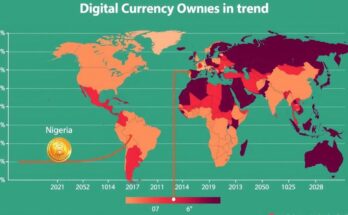Rebels in the eastern DRC control the Rubaya coltan-mining region, generating $300,000 monthly in production taxes. The M23 movement’s activities, linked to heightened conflict and resource exploitation, prompted the UN to highlight the need for sanctions against those benefiting from this illicit trade. The situation has led to severe human rights violations and significant displacement of civilians.
Rebels in the eastern Democratic Republic of Congo (DRC) have established firm control over the Rubaya coltan-mining region, imposing a taxation structure on production that is expected to yield approximately $300,000 in monthly revenues, as reported to the United Nations Security Council on Monday. The M23 movement, a Tutsi-led faction allegedly receiving support from Rwanda, captured this strategic area, known for its extraction of minerals vital for the manufacturing of smartphones and computers, following a series of intense confrontations in April. Bintou Keita, the head of the UN mission in the DRC, informed the Security Council that the mineral trade in the Rubaya region is responsible for over 15% of the global supply of tantalum. The DRC is recognized as the leading producer of tantalum, a mineral deemed critical by both the United States and the European Union. “This generates an estimated $300,000 in revenue per month to the armed group,” stated Ms. Keita. “This is deeply concerning and needs to be stopped.” She further elaborated on the impact of illicitly traded natural resources, noting, “The criminal laundering of the DRC’s natural resources smuggled out of the country is strengthening armed groups, sustaining the exploitation of civilian populations, some of them reduced to de-facto slavery, and undermining peace-making efforts.” The majority of the DRC’s mineral reserves are located in the eastern regions, which have been entrenched in conflict among various armed factions over territorial and resource disputes. The situation has intensified following the resurgence of M23 activity since March 2022, resulting in significant loss of life and displacement of over 1 million individuals. Manufacturers of electronic devices are facing increasing scrutiny to ensure that metals sourced from their products, such as those utilized in laptops and electric vehicle batteries, do not originate from conflict-ridden areas like eastern Congo. Ms. Keita expressed concern regarding the militarization of armed groups as they become involved in profit-driven ventures related to mining: “Unless international sanctions are imposed on those benefiting from this criminal trade, peace will remain elusive, and civilians will continue to suffer.”
The Democratic Republic of Congo is rich in mineral resources, particularly tantalum, which is essential for numerous electronic applications. The armed conflict in the eastern regions is largely driven by competition over these valuable resources, leading to the emergence of various militias and rebel groups. The M23 movement’s recent activities have highlighted the troubling intersection of mineral wealth, armed conflict, and human rights abuses, drawing international attention and calls for action to prevent further complicity in these practices through corporate supply chains that may inadvertently fund violence.
The developments in the Rubaya coltan-mining region underscore the serious implications of unresolved conflicts fueled by valuable natural resources in the DRC. The UN’s call for international sanctioning reflects the urgent need for a collective approach to counter the economic empowerment of armed groups through the illicit mineral trade. The exploitation of local populations and the escalating violence necessitate immediate action to restore peace and protect human rights in the region.
Original Source: www.mining.com




